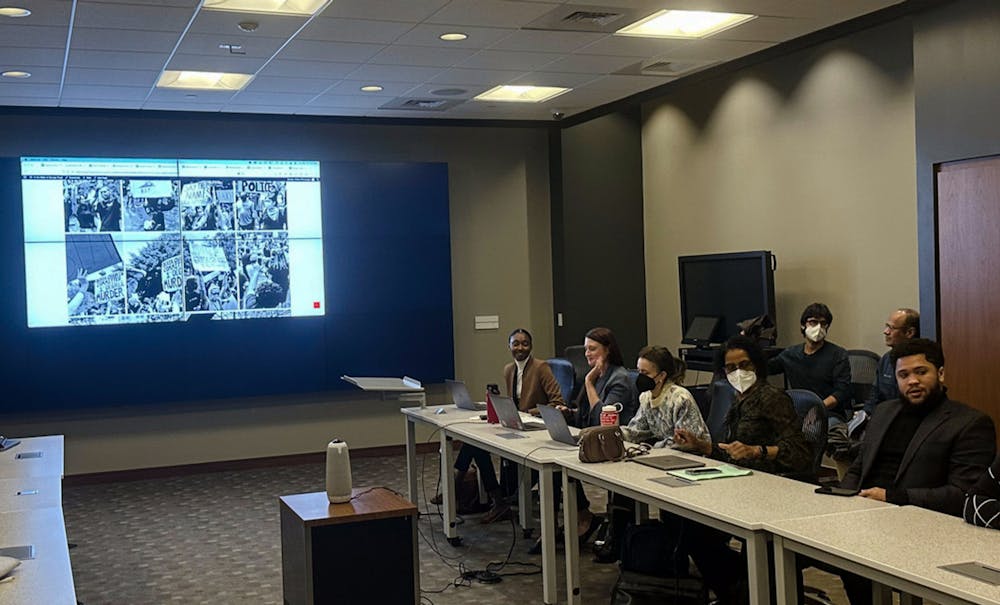The Center for Latin American and Caribbean Studies and the Center for Digital Scholarship presented a project documenting Rhode Island’s response to George Floyd’s 2020 murder at a showcase hosted at the Digital Scholarship Lab Tuesday afternoon.
“In the Wake of George Floyd: Responses to Anti-Black Racism in Rhode Island” documents how Rhode Island communities responded to the aftermath of Floyd’s death along with “broader experiences of anti-Black racism and police violence,” according to the Watson Institute for International and Public Affairs’ website. The team is continuing to develop the project further, according to project members.
The event highlighted the project’s multiple components, including a timeline of racial justice activism in the state, a series of analytical essays, a catalog of demonstrations in Rhode Island and a series of interviews with local activists.
In an interview with The Herald, CLACS Director Patsy Lewis, the project’s lead researcher, described the project as “a way to insert Rhode Island into the conversation” of both national and international demonstrations related to racial justice in 2020.
CLACS decided to pursue the project after the Office of the Provost offered financial support to academic departments and centers at the University that wanted to address systemic racism through their work, Lewis said. According to Jay Rowan, chief of staff to the provost, the office funded several proposals related to racial justice through the Addressing Systemic Racism Fund, part of Brown’s response to Floyd’s killing.
At the event, Black Lives Matter Rhode Island Political Action Committee Director Harrison Tuttle — one of the activists interviewed for the project — said that getting involved with the project was “incredibly important” to maintain momentum surrounding racial justice activism.
The project was shaped by public reactions to Floyd’s death, Lewis said.
“Why did (Floyd’s death) resonate with people’s specific experiences?” Lewis said. “What does it tell us about the resonances between people’s experiences with the state and the police, and why do they connect to George Floyd?”
Several University students, including Isabella Garo ’24 and Niyoshi Parekh '22.5, were involved in collecting data and developing the project.
Garo hopes that “this project demonstrates that grassroots movements can have real impacts,” she wrote in an email to The Herald. “Ideally, this project will boost the voices of the people of Rhode Island, reminding their government that real, systemic change is popular and necessary.”
Both Parekh and Garo noted CLACS’s welcoming environment.
“My experience at CLACS was amazing,” Garo wrote. “My coworkers were all extremely kind, intelligent and passionate, and I am very grateful that my first-ever research job could be with such a group of people.”
“Everyone was very welcoming and passionate about the project,” Parekh added.
Lewis said that members wanted the project’s layout to be easily accessible, featuring community members’ personal experiences.
Both Lewis and Tuttle described challenges associated with engaging activists and Rhode Island residents during the project.
When reaching out to community activists, Lewis said that some people were skeptical about speaking to project members. “When you engage with people outside of academia, they want to know that they’re not just fodder for your work,” she said.
Tuttle added that although activists like him are working to promote racial justice “all the time,” the general public and media will often “only react to reactionary events of police brutality or outrage.”
Lewis hopes that making a digital project, rather than a report “on a shelf that people won’t read,” will provide “teaching tools” to the community. The center’s project helps “keep the memory of these (protests) alive,” Lewis said. Responses to Floyd’s death won’t “just fade as if there’s no record.”
This project is “creating history,” Lewis said. “It’s creating oral history and putting it in an easily accessible place.”
Clarification: A previous version of this article did not include that the event was co-sponsored by the Center for Digital Scholarship. The article has been updated.

Neil Mehta was the editor-in-chief and president of the Brown Daily Herald's 134th editorial board. They study public health and statistics at Brown. Outside the office, you can find Neil baking and playing Tetris.
Kaitlyn Torres was the senior editor of community for The Brown Daily Herald's 133rd Editorial Board. She previously covered diversity as a University News section editor. In her free time, Kaitlyn enjoys listening to The Arctic Monkeys and going on archaeological digs.





